-
Strategies for Going Green at Your Business
Choosing eco-friendly products, recycling, and reducing waste in the workplace can be good for both the environment and your bottom line. If you’re hoping to go green at work and cut down on your company’s waste in Atlanta , then watch this video for some smart strategies to consider.
You can start going green by looking for non-toxic cleaning and bathroom products, which can promote better indoor air quality. To save money on operational costs, consider switching to energy-efficient light bulbs, motion sensor lights, and on-off sensors for faucets. Next, to reduce waste, avoid using disposable utensils, plates, and cups in your break room. Finally, look into what incentives for going green are available for businesses in your area.
-
Spotlight on Our Equipment Maintenance Services
If your business uses waste management equipment, be sure to trust Southern Waste and Recycling for all of your maintenance and service needs. We proudly offer a range of services and repairs for balers, compacters, and other waste management tools. Whether you are in need of a dumpster in Atlanta, or you are seeking emergency repairs for your trash compactor, we will provide you with prompt and efficient services.
To ensure that your compactor or baler remains up and running for all of your daily operations, consider signing up for our preventative maintenance program. When you rely on our company for preventative repairs, you can rest assured that your waste management equipment will remain up and running at all times. In the event of an emergency, we will also be on call to provide you with immediate repairs. Our trash service company is committed to the satisfaction of our customers, and we will restore your equipment to functional condition as quickly as possible.
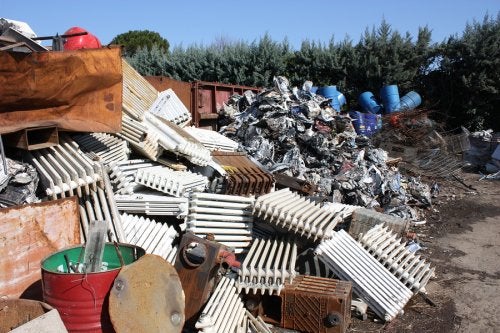
-
What You Should Know About Industrial Hazardous Waste Disposal
If your industrial processes create hazardous waste, it will be your responsibility to make sure that these potentially toxic and harmful materials are disposed of in a safe and environmentally friendly manner. Rather than creating a hazardous waste management plan on your own, you can hire a company that specializes in waste disposal and recycling near Atlanta. Your waste management team will help you create a safe and effective solution for effectively processing your hazardous waste. Read on for a look at what you need to know about industrial hazardous waste disposal .
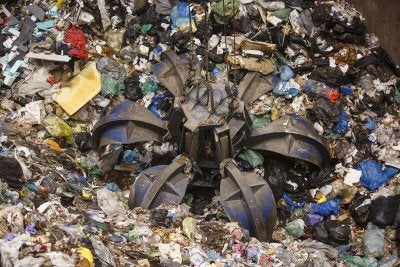
Hazardous waste should be reduced whenever possible.
While it may not always be possible to completely reduce or eliminate the amount of hazardous waste that is generated by your business, it is important to cut down on your hazardous waste generation whenever possible. To reduce the quantity of hazardous materials that are created by your business, you can look for ways to substitute hazardous items with non-toxic products. It may also be possible to upgrade your industrial equipment with parts and equipment that cut down on hazardous waste.
Hazardous waste must be disposed of in accordance with regulations.
Federal regulations mandate that industrial hazardous waste must be disposed of using proper methods and materials. If you neglect to follow your federal or local waste disposal guidelines, you could end up facing steep fines and other penalties. A waste management company in your area will be able to answer any questions that you may have about industrial waste disposal for your business.
Hazardous waste needs to be placed in the proper receptacles.
When hazardous waste enters the water supply or soil that surrounds your industrial facility, it can create serious environmental problems. To protect the environment and prevent serious repercussions, industrial facilities must place their hazardous waste in designated trash receptacles. If you are uncertain about how to safely manage the industrial waste that is created by your company, do not hesitate to consult with an experienced waste management professional.
-
Spotlight on Hazardous Waste Regulations for Academic Laboratories
Scientific inquiry is a cornerstone of academic study at the undergraduate and graduate levels. As the operator of an academic laboratory, it is essential that you set up safe and sustainable waste management services for your facility. With services from a company that specializes in waste near Atlanta , you can schedule secure trash pickup services for the hazardous waste that is generated by your lab.
Since academic labs create unique and varied amounts of hazardous waste, they are provided with some flexibility around scheduling their hazardous waste pickups. Depending on the size of your facility, you may be designated as a large, small, or very small quantity generator. At any designation, a hazardous waste generator must create a hazardous waste management plan that follows EPA guidelines. These guidelines state that hazardous laboratory waste must be removed from the site at least once every six months. All hazardous waste management plans should be authorized by lab managers or other trained professionals.
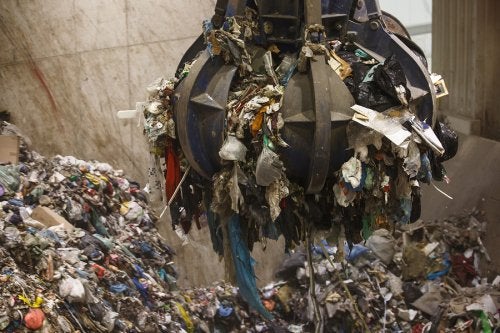
-
A Guide to Universal Waste
Proper waste management is very important for businesses that generate hazardous materials as a part of their routine operations. If your business discards batteries, pesticides, or products that contain mercury, you are obligated to participate in the universal waste program that has been created by the EPA. A company that offers waste disposal and junk removal in Atlanta will be able to help you create a safe processing plan for the hazardous waste that is created by your business. To help you comply with EPA standards, here is a brief guide to what you need to know about universal waste.
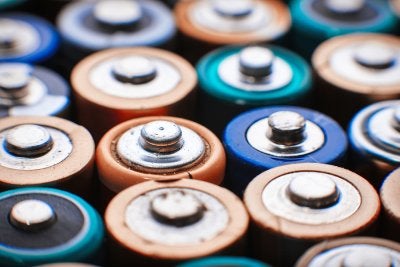
The Purpose of the Universal Waste Program
In recent decades, the EPA has recognized that certain types of hazardous waste are frequently discarded by many different types of businesses and industries. In order to streamline the collection process and keep hazardous materials out of landfills, the EPA created the universal waste program. This program regulates the processing of hazardous waste collection, and also helps companies with the proper disposal of potentially toxic and harmful materials.
The Types of Universal Waste
Universal waste falls into a few, distinctive categories. Batteries are among the most common types of universal waste that businesses toss out every day. All types of batteries are considered to be hazardous once they have been placed in the trash. Other categories of universal waste include pesticides, as well as equipment and lamps that contain traceable amounts of mercury. All of these items need to be safely handled by a designated waste processing facility.
The Categories of Universal Waste Participants
A company’s participation in the federal universal waste program will be dictated by the quantity of hazardous waste that it handles every day. Companies that produce small amounts of waste are categorized as small quantity handlers. Larger organizations and companies that generate high volumes of hazardous waste earn the designation of large quantity handlers. No matter your designation, a waste management company will help you safely process your universal waste products.
-
Identifying Sources of Hazardous Waste in Your Small Business
Hazardous waste may be an unexpected byproduct of your business operations. Whether you are setting up a new small business, or you have been operating for years, it is important that you identify any hazardous waste that you may generate during your workdays. A company that specializes in waste near Atlanta will be able to help you create a waste disposal plan that allows you to handle these materials correctly.
To ensure that your waste management methods are EPA-compliant, you will need to assess and identify any hazardous waste that is created by your business. Hazardous waste is defined as any type of solid waste that is ignitable, corrosive, reactive, or otherwise toxic. For your reference, the EPA has created a list of more than 400 types of hazardous waste as defined by the Resource Conservation and Recovery Act. By consulting with this list, you will be able to easily determine whether your business creates hazardous waste. After your hazardous waste has been identified, you will be able to create a hazardous waste management plan.
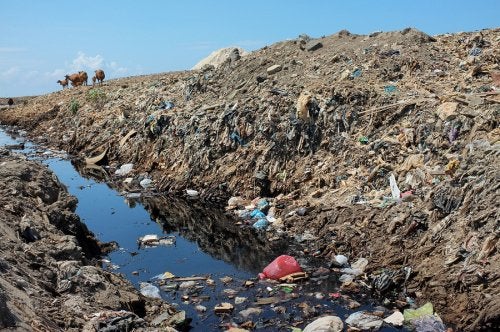
-
The Role of Landfills
If your business is like many others, then you rely heavily on dumpster rental services or trash pickup near Atlanta. Have you ever wondered what happens after the waste is removed from the dumpster? The trash that’s taken from your company’s dumpsters is transported to a landfill, and locations like these play an important role in waste management.
Today’s landfills are well-managed facilities that provide a place for the disposal of solid waste. These locations are monitored, operated, and designed to guard the surrounding environment against contamination from the waste stream. Also, landfills are engineered to comply with federal regulations and use monitoring systems designed to protect the environment by checking for signs of groundwater contamination and landfill gas. The disposal of solid waste in landfills is one part of an integrated waste management process, and modern landfills are created in accordance with strict requirements that were established under the Resource Conservation and Recovery Act.
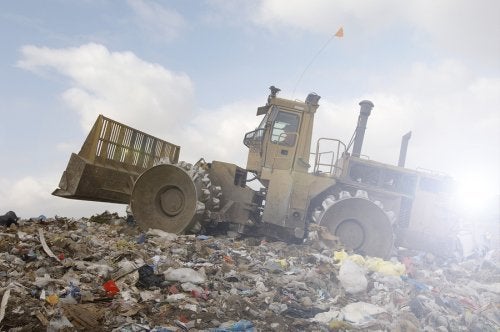
-
The Differences Between Solid, Hazardous, and Toxic Waste
There are all different types of waste near Atlanta, and the way you should handle your waste depends on the kind that you’re dealing with. The terms solid, hazardous, and toxic are 3 adjectives used to describe different types of waste. While solid waste is relatively easy to recognize and understand, the terms hazardous and toxic tend to throw people off. Knowing what kind of waste you have is important when it comes to choosing the proper type of waste disposal, and you can always ask your waste management professional for help . Keep reading for a brief overview of the differences between solid, hazardous, and toxic waste.
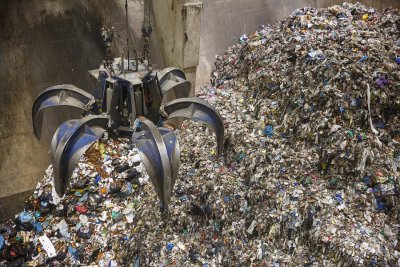
Solid
The category of solid waste might seem self-explanatory, but it may also include more than you expected. Solid waste refers to the garbage in your trashcans, but it also includes wastes of different states of matter. Liquid and gaseous wastes, like sludge and pollutants, can also fall under the umbrella of solid waste. Municipal solid waste, or MSW, is the name for general solid waste that comes from public garbage cans or residential homes. Much solid waste can be recycled, especially materials like plastic and aluminum, but a great deal of it also ends up in landfills.
Hazardous
When a waste material is considered hazardous, it no longer fits within the realm of solid waste. However, hazardous waste is not exactly the same as toxic waste. The Environmental Protection Agency outlines a few criteria that can qualify a particular type of waste as hazardous. Waste that is corrosive, flammable, or reactive can be considered hazardous, but toxicity is also a potential component of hazardous waste. It’s important to handle hazardous waste carefully, which is why the job is usually left for the professionals.
Toxic
Unlike solid and hazardous wastes, toxic waste is a very specific type. According to the Environmental Protection Agency, waste must be harmful or deadly to people or animals that ingest it. Thus, toxic waste still falls under the category of hazardous waste, but it’s not the same thing. You will also need a professional to handle toxic waste.
-
Exploring the Dangers of Trash
Everyone has to do something with the waste near Atlanta that they generate, or it will continue to pile up. Without trash pickup services, the aesthetic appeal inside and outside of your building may be at risk. Unfortunately, there are many other potential hazards in addition to reduced cosmetics. When waste piles up, it may ultimately attract pests. These pests are eyesores in themselves and can turn people away from your home or your place of business, and they can even spread disease to your family or your customers. Continue reading if you’re interested in exploring the dangers of trash.
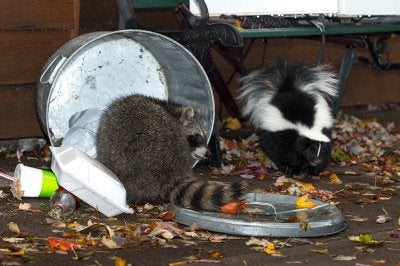
Cosmetic Eyesore
The curb appeal of a home or business place can impact the overall appearance of the neighborhood, which means everyone in the community may be concerned. If you allow waste to pile up on your property, keep in mind that you might be bringing down your neighbors’ property values. Some people let waste build up inside their buildings, which can also be detrimental. This will take away from the interior design scheme that you’ve worked so hard on, and it can reduce the overall value of your property. If you want to preserve your curb appeal, it’s a good idea to develop a waste management plan.
Attraction of Pests
If you know anything about pests, you know that they tend to show up when there’s a bunch of waste around. Neglecting your trash can serve as a warm welcome for all kinds of bugs, rodents, and pests, and they will further take away from the curb appeal of your house or business. Even if the waste problem is outside, the pests that it attracts may very well find their way in.
Introduction of Disease
Waste buildup and pest problems aren’t just aesthetic issues—both of these problems can actually be harmful to your health. The pests that come to check out your waste can spread disease through bites and physical contact as well as traces of urine and feces left behind. Make sure you establish a viable waste management plan to keep your space free of disease.
-
See How to Recycle Aluminum
Aluminum is a great material for recycling serving Atlanta, and this type of metal recycling can have a substantially positive impact on the environment . Since people go through more than a million pounds of aluminum on a daily basis, it’s extra important that we commit to recycling this material. Check out this video and see how to recycle aluminum.
When it comes to recyclable materials, aluminum is always part of the conversation. Aluminum is so recyclable that more than half of it still exists today, and Americans alone go through hundreds of millions of cans per day. First the recycling pros will collect aluminum and remove any plastics or paper. Then a hydraulic press crushes the remaining metal into bales. The collected and baled aluminum is then melted down so that it can be turned into a new aluminum sheet. This reduces greenhouse gases, saves energy, and protects the environment.
RECENT POSTS
categories
- Uncategorized
- Waste Management Atlanta
- Waste Disposal and Recycling
- Hazardous Waste Disposal
- Chemical waste removal
- solid waste removal
- R3 Program
- Sustainable Organizations
- Sustainable Waste Removal
- Commercial Waste Removal
- Materials Management Program
- Dumpster Rental
- Roll Off Dumpsters
- Construction Site Waste Removal
- Sustainability
- Recycling in Atlanta
- Industrial Recycling
- Industrial Waste Removal Services
- Southern Waste & Recycling
- Waste Removal Atlanta
- Waste Specialists
- Atlanta
- Infographic
- Front Load Dumpsters
- Rear Load Dumpsters
- Reusable Electronics
- Dump Truck Atlanta
- Recyclable Electronics
- Trash Compactors
- Recycling
- Recycling Program
- Office Recycling
- Metal Recycle
- Electronic Waste
